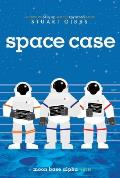Airlocked-Room Mystery
In 2002, M. T. Anderson began his novel Feed with the line, “We went to the moon to have fun, but the moon turned out to completely suck.”
The first narrative page of Stuart Gibbs’s Space Case from 2015 includes the line, “Life in outer space sucks. Believe me, I know.”
I note that parallel not to underscore the similarity of the two books in the science fiction mode, but to introduce how they zoom off in different directions from that point.
Anderson wrote a young adult novel that took place mostly in its enervated narrator’s head and conversations. The big dramatic turns are shopping expeditions and a fatal disease. It turns out the moon isn’t the only place that completely sucks.
Space Case, in contrast, is for “Ages 8-12.” It’s plot-driven, not character-driven. The hero’s sucky life on the Moon gets a jolt of excitement from a mysterious death that only a twelve-year-old can solve. With a limited cast of characters, the lunar base a fine set-up for a murder mystery.
In the end, however, the science fiction wins out over the mystery in Space Case. The explanation for the death turns out to involve a scientific discovery that the narrator and readers weren’t privy to earlier in the story. Though that resolution’s beyond the bounds of current science, it’s not beyond the bounds of a science-fiction fan’s imagination.
The first narrative page of Stuart Gibbs’s Space Case from 2015 includes the line, “Life in outer space sucks. Believe me, I know.”
I note that parallel not to underscore the similarity of the two books in the science fiction mode, but to introduce how they zoom off in different directions from that point.
Anderson wrote a young adult novel that took place mostly in its enervated narrator’s head and conversations. The big dramatic turns are shopping expeditions and a fatal disease. It turns out the moon isn’t the only place that completely sucks.
Space Case, in contrast, is for “Ages 8-12.” It’s plot-driven, not character-driven. The hero’s sucky life on the Moon gets a jolt of excitement from a mysterious death that only a twelve-year-old can solve. With a limited cast of characters, the lunar base a fine set-up for a murder mystery.
In the end, however, the science fiction wins out over the mystery in Space Case. The explanation for the death turns out to involve a scientific discovery that the narrator and readers weren’t privy to earlier in the story. Though that resolution’s beyond the bounds of current science, it’s not beyond the bounds of a science-fiction fan’s imagination.



No comments:
Post a Comment